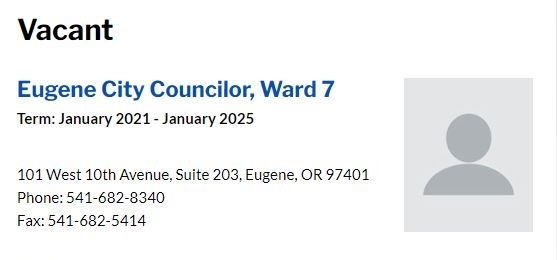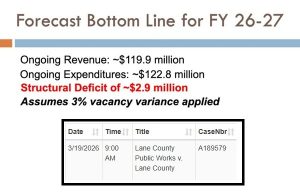Ward 7 council seat draws 3 early applicants
3 min read
Three persons have already submitted applications for the vacant Ward 7 seat on the Eugene City Council, according to City Recorder Katie LaSala.
Community organizer Daniel Takamori was the first applicant on Oct. 9; local business owner and 34-year resident Carol Zorn applied Oct. 13, and Stephanie Dugger, a resident of Eugene since 1984, joined them Oct. 17.
Applications for the interim appointment are being accepted until 5 p.m. on Wednesday, Nov. 9. Application forms are available on the city website and from the city recorder’s office, 101 W. 10th Ave., Suite 203.
The official application on the city website poses 23 questions, including:
- What are your unique qualifications for representing Ward 7?
- What are the three most important issues facing the residents of Ward 7?
- What do you see as the most pressing need for the Eugene community and what would be your top priority as a City Councilor?
Applicants must reside in Ward 7, be a legal elector under the laws and constitution of the state and be a resident of the city for one year immediately before being appointed to office.
Interviews with the Eugene City Council will be scheduled in early December. The interim appointment will be made in December 2022 and the person appointed will serve until a successor, duly elected in May of 2023, takes office in July of 2023. The successor, elected in May of 2023, will serve out the remainder of the current Ward 7 councilor’s term; the current four-year term runs from January 2021 to January 2025.
The Ward 7 seat is vacant following the first recall of a city councilor in Eugene history, organized by residents opposed to Emerald Express “EmX” buses on River Road.
The protest started with business and property owners along Eugene’s major transportation corridors who discovered preliminary design drawings by the engineering firm CH2M Hill. The concept drawings demonstrated potential changes to parking and business access.
Others protested the climate costs of the EmX system, which requires diesel buses running on specially-constructed traffic lanes, and which could eliminate up to 132 trees along the River Road route during construction. Opponents quoted a Medford transportation analyst who stated bluntly that EmX bus rapid transit would never produce a net reduction in greenhouse gas emissions.
Others opposed the loss of the two traffic lanes—one in each direction—which would be reserved as Bus and Turn lanes, or BAT lanes, for the EmX buses and turning vehicles.
Opponents also pointed to lower-than-projected ridership on the Springfield and West Eugene “EmptyX” routes. Santa Clara residents suggested the low ridership along River Road was due to LTD’s hub-and-spoke network design. A cross-town traveler must first go downtown to the Eugene Station “hub” to transfer to a bus traveling along a different “spoke” to reach her final destination.
Organizers said they hoped the dramatic recall election would prompt the council to reopen its discussion and reject EmX.
Despite the recall, the March votes for River Road EmX as the “locally preferred alternative” empower city and LTD staff to pursue funding sources which, according to local transportation experts, were only available for EmX projects.
LTD General Manager Mark Johnson indicated at the monthly LTD board meeting Oct. 19 that in the wake of the recall election, the transit agency would be reviewing its public engagement strategy. He was silent on whether the board would revisit its choice for the locally preferred alternative.
Staff members of the transportation non-profit Better Eugene Springfield Transportation, which before the recall advocated for EmX and related MovingAhead and Transit Tomorrow projects, confided to a BikePortland reporter for an Oct. 13 story that they “aren’t entirely sold on EmX as the best treatment for River Road.”
However, BEST declined to answer further questions about how the community might revisit the locally preferred alternative. BEST also declined to indicate its current position on Transit Tomorrow, which would eliminate neighborhood routes to shift resources to the high-frequency EmX routes.





